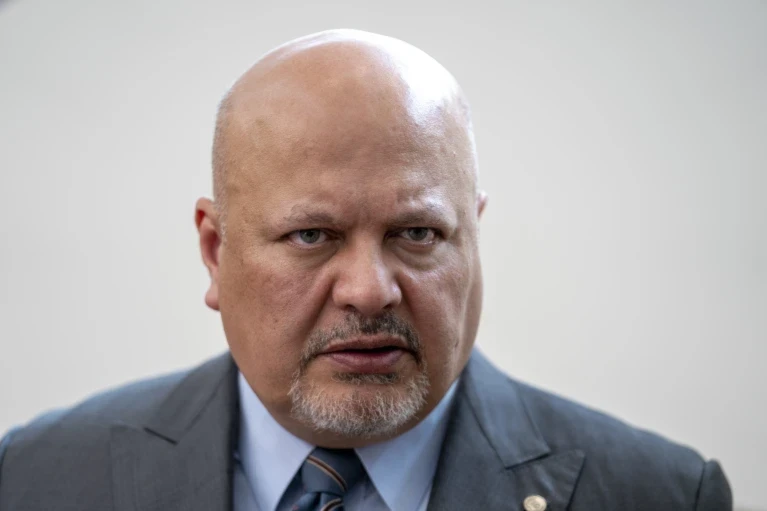Trump’s sanctions on ICC prosecutor hamper investigations
Sanctions imposed by the Trump administration on ICC chief prosecutor Karim Khan have disrupted the court’s operations, risking justice for war crime victims and raising concerns over US foreign policy toward the International Criminal Court.
-

Karim Khan, Prosecutor of the International Criminal Court, looks up before a press conference in The Hague, Netherlands, on July 3, 2023. (AP/Peter Dejong)
The International Criminal Court’s (ICC) chief prosecutor, Karim Khan, has faced severe obstacles since the Trump administration imposed sanctions against him in February.
These sanctions have disrupted the court’s work, freezing Khan’s bank accounts, cutting off his email access, and warning American ICC staffers of potential arrest if they travel to the United States. The move has raised serious concerns about the future of the ICC and its ability to conduct war crimes investigations.
The sanctions followed a November decision by the ICC to issue arrest warrants for Israeli Prime Minister Benjamin Netanyahu and former Security Minister Yoav Gallant. The warrants accused them of war crimes linked to actions in the Israeli occupation’s assault on the Gaza Strip.
In retaliation, the Trump administration sanctioned Khan and barred him and other non-Americans among the ICC’s staff from entering the US, threatening fines and imprisonment for anyone providing financial or technological support to the prosecutor.
Consequences for ICC staff and investigations
These sanctions have severely hampered the ICC’s ability to operate.
Moreover, Khan’s email with Microsoft was canceled, forcing him to switch to a Swiss provider, and his UK bank accounts have been blocked.
On that note, American ICC staffers risk arrest if they return to the US, leading to resignations and a shrinking workforce. Non-governmental organizations and contractors, fearing US reprisals, have also curtailed cooperation, which has impeded evidence gathering and witness support crucial for investigations.
Effects on Sudan and Palestine probes
The sanctions’ impact extends beyond the investigation into Israeli officials, stalling the ICC’s probe into atrocities in Sudan, including genocide charges against former President Omar al-Bashir, amid escalating violence, and complicating inquiries into alleged crimes in the Palestinian territories.
These disruptions threaten victims’ access to justice and undermine the court’s mandate to hold perpetrators accountable.
US policy motivations and reactions from 'Israel' and the ICC
The Trump administration justified the sanctions by accusing the ICC of illegitimate actions targeting the US and its ally, the Israeli regime.
Additionally, Washington denies the court’s jurisdiction over "Israel" and claims the ICC’s investigations endanger US personnel and national security.
Israeli leaders, including Netanyahu, have dismissed the charges as unfounded, with "Israel’s" Knesset considering legislation to criminalize cooperation with the ICC.
#ICC Prosecutor @KarimKhanQC announces applications for arrest warrants in relation to Benjamin Netanyahu and Yoav Gallant in the context of the situation in the State of #Palestine ⤵️https://t.co/WqDZecXFZq pic.twitter.com/bxqLWc5M6u
— Int'l Criminal Court (@IntlCrimCourt) May 20, 2024
Meanwhile, ICC officials condemn the sanctions as serious attacks on international law and the court’s independence.
Several lawsuits filed by US court staff and consultants challenge the sanctions, arguing they violate freedom of expression and obstruct justice. On that note, a recent temporary court order provided partial relief to ICC prosecutor Eric Iverson, permitting limited legal functions while legal battles continue in US courts.
However, uncertainty persists for other American ICC personnel, while the court also faces reluctance from member states to enforce warrants and increasing internal challenges, including allegations against Khan unrelated to the sanctions.

 3 Min Read
3 Min Read








